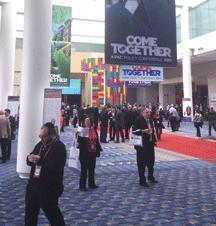
I am perplexed at the widespread resistance to AIPAC by many good Jews who care about Israel. I am saddened that the four-day AIPAC Policy Conference in Washington, D.C., has been described in the press only by Trump’s speech, when it has so little to do with that.
I attended the conference along with 18,700 Jews, Christians and over 4,000 college students from every state. We were there for a common single purpose — to strengthen the relationship between Israel and the United States. Don’t all Jews want a safe and secure Israel? Isn’t it obvious that strong support of Israel from the U.S. Congress is critically important?
AIPAC’s contribution to getting that support is nonpareil. It takes a lot of expertise, resources and ongoing effort to develop the facts and presentations, disseminate the information, initiate the congressional resolutions and actions that are helpful to Israel, and to arrange and fund the eye-opening, life-changing personal trips to Israel by all members of Congress and so many others. AIPAC accomplishes all this through its educational foundation.
At the conclusion of the policy conference, thousands of Israel supporters visit every member of Congress — both representatives and senators — to ask for support for Israel. Every member of Congress also gets attention from their constituents at home at the grassroots level to establish access and an opportunity to make Israel’s case on an ongoing basis.
That is why many members of Congress with virtually no Jews in their districts are strong supporters of the U.S.-Israel alliance. Through AIPAC’s efforts there has been consistent strong congressional support for Israel — no matter who is in office in Israel or who holds the majority in Congress — for many decades. We cannot take this support for granted, or make support for AIPAC dependent on our personal political views.
Here’s a good example: AIPAC lobbied Congress long and hard to finance the Iron Dome missile defense system. Through that effort, many Jewish lives were saved. Numerous times we were told by members of Congress — no AIPAC no Iron Dome. Now, with multiple new threats on its borders, Israel needs continuing congressional support to fund the new David’s Sling missile defense system.
It is self-defeating to oppose AIPAC on the claim that it has a political agenda outside of its mission to strengthen the U.S.-Israel alliance. AIPAC works hard to be bipartisan. There are many Democrats and Republicans supporting AIPAC. I can attest that AIPAC leadership urges conference attendees to leave our political affiliations at the door and to focus on the one mission — strengthening U.S.-Israel relations. They continually point out that since we do not know who will be in power next year in either country, it is unwise to politicize this critically important mission. That’s not to say that these same AIPAC supporters don’t go home and pursue their own political agendas, but the group comes together well on issues of Israeli security.
Hundreds of speakers came to talk to us, bringing their incredible depth, breadth and diversity of expertise. Speakers included many local, state and federal elected officials from both parties. Prominent Israelis, including Prime Minister Benjamin Netanyahu and opposition leader Isaac Herzog took the stage. European leaders from the EU, the U.K., Greece, Belgium, Australia and Hungary spoke to us. Officials from the U.S. State Department, the U.S. Treasury and numerous current and former U.S. agency people were on the program. We were updated on developments in the U.N., the activities of Iran, and the limitations of the IAEA.
We saw that, while not perfect, Israel is truly a liberal democracy and the most progressive, diverse and open country in the region. We learned how and why Israel is a great and valuable friend and ally to the United States. We learned the ways in which a strong U.S.-Israel alliance benefits both countries and their people, and how critically important it is to have U.S. support, which only Congress can fund.
Yes, Trump was a speaker, too. I think it was imperative to host him as one of four presidential candidates. My personal observation is that Trump got the most subdued and tentative welcome of the four when he entered the arena and took the podium. His support in the room was lukewarm at best. He gave a speech, to the surprise of all I think, which cogently covered most all the issues pertaining to Israel’s safety and security. He pledged to be supportive of Israel in every way, including at the U.N. Yes, it is true the crowd reacted more and more positively to his statements as he went along. He got that positive feedback, not for who he is but for what he said on our issues. Will he deliver? Who knows? But I hope Trump went away with a good feeling about the pro-Israel people in attendance. Because the reality is that he may be our next president, whether any of us likes it or not. If Trump becomes president I will be greatly relieved if he stands by the statements and pledges he made at the conference. I think there is a better chance that he will because he made these public statements on the record at AIPAC and because of the personal relationships that were established with him by Israel advocates.
On Purim we learned the value of access to leadership when it comes to the security of the Jewish people, and that holds true at all times. Securing Israel’s security through a strong relationship between Israel and the United States is AIPAC’s mission.
Victor Bergman is an attorney practicing in the law firm of Shamberg, Johnson & Bergman.


